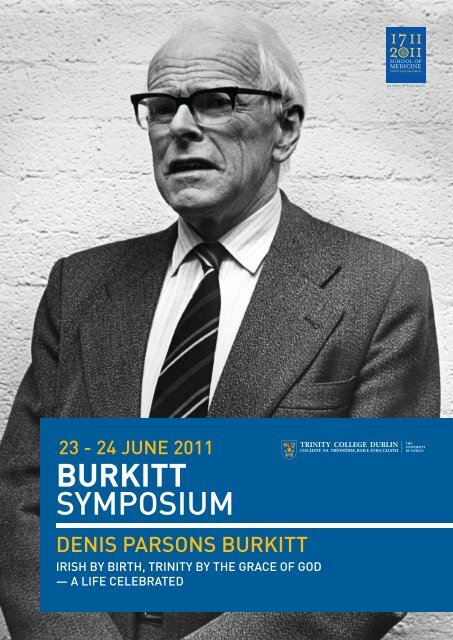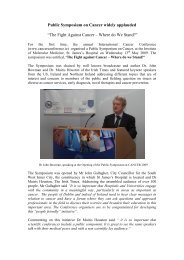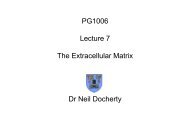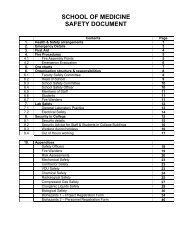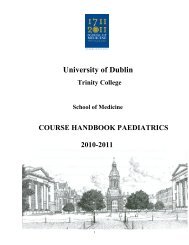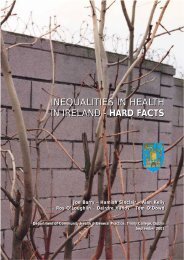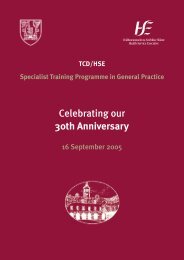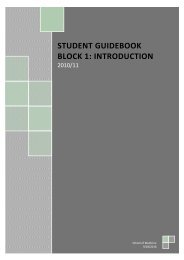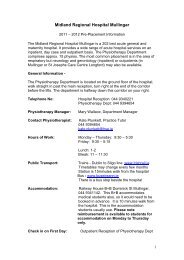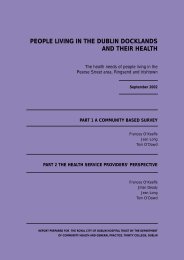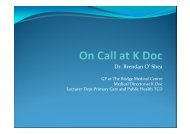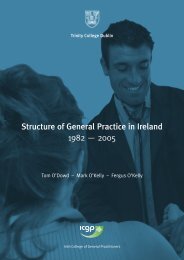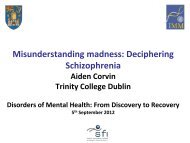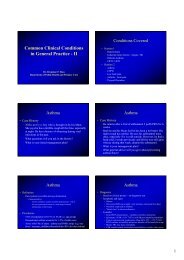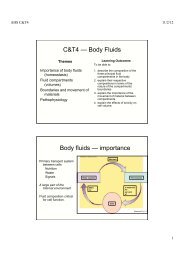BURKITT SYMPOSIUM - School of Medicine - Trinity College Dublin
BURKITT SYMPOSIUM - School of Medicine - Trinity College Dublin
BURKITT SYMPOSIUM - School of Medicine - Trinity College Dublin
You also want an ePaper? Increase the reach of your titles
YUMPU automatically turns print PDFs into web optimized ePapers that Google loves.
23 - 24 JUNE 2011<strong>BURKITT</strong><strong>SYMPOSIUM</strong>DENIS PARSONS <strong>BURKITT</strong>IRISH BY BIRTH, TRINITY BY THE GRACE OF GOD— A LIFE CELEBRATED
23 - 24 June 2011<strong>BURKITT</strong> <strong>SYMPOSIUM</strong>WELCOMEPr<strong>of</strong>essor Owen P. Smith,Chair <strong>of</strong> Haematology, <strong>Trinity</strong> <strong>College</strong>, <strong>Dublin</strong>Dear Friends and Colleagues,I would like to take this opportunity to welcome you to <strong>Dublin</strong> to celebrate theone hundredth year anniversary <strong>of</strong> the birth <strong>of</strong> Denis Parsons Burkitt, one <strong>of</strong>the great physician scientists <strong>of</strong> the twentieth century who had a tremendousability to turn simple clinical observation into major scientific discovery. We arefortunate, not only to be hosting his centenary at the University <strong>of</strong> <strong>Dublin</strong>, <strong>Trinity</strong><strong>College</strong>, where he graduated in medicine in 1935, but also as this Symposium ispart <strong>of</strong> the <strong>School</strong> <strong>of</strong> <strong>Medicine</strong> Tercentenary celebrations.The Symposium will function as an exclusive forum for family and friends <strong>of</strong>Denis together with international experts to share and compare experiences inrelation to the lymphoma that is named after him. With this in mind, the first day<strong>of</strong> the conference will mainly focus on Denis, the man, physician scientist and hismain legacy, the discovery and early treatment strategies <strong>of</strong> the commonest cancer in sub-Saharan African children.The second day will focus on recent developments in term <strong>of</strong> diagnostics, prognostic markers, risk-stratificationmethodologies and clinical trial outcomes. The molecular pathobiology <strong>of</strong> Burkitt lymphoma will be addressed bysome <strong>of</strong> the world’s leading experts and true clinical discussion between practicing physicians and researchers onunresolved issues will follow. At the end <strong>of</strong> the second day participants will have the advantage <strong>of</strong> discussing anddebating the unresolved issues, especially those most relevant in third world countries.During the Symposium there will be, for the first time, an exhibition <strong>of</strong> a selection <strong>of</strong> key artefacts that were pivotal innailing down the association <strong>of</strong> lymphoma incidence and geography.I hope you find the programme exciting, as I do believe it will provide a meaningful platform providing up-to-dateinformation, not only for basic / translational science researchers but also for clinical haemato-oncologists, nursesand students alike.I look forward to meeting you over the next two days and to celebrate the life <strong>of</strong> Denis Parsons Burkitt in the beautifulenvirons <strong>of</strong> <strong>Trinity</strong> <strong>College</strong>.Pr<strong>of</strong>essor Owen P. SmithChair <strong>of</strong> Haematology, <strong>Trinity</strong> <strong>College</strong> <strong>Dublin</strong>.Page 1
23 - 24 June 2011<strong>BURKITT</strong> <strong>SYMPOSIUM</strong>23 - 24 June 2011<strong>BURKITT</strong> <strong>SYMPOSIUM</strong>SUPPORTThis Symposium has been made possible by the generous support <strong>of</strong>:TABLE OF CONTENTSWELCOMESUPPORT & THANK YOUTABLE OF CONTENTSPROGRAMME - Day 1PROGRAMME - Day 2DENIS PARSONS <strong>BURKITT</strong>GENERAL <strong>SYMPOSIUM</strong> INFORMATIONFEATURED SPEAKERSNOTES123457101430THANK YOUMrs Olive Burkitt and daughters Judy, Cas and Rachel<strong>Trinity</strong> Foundation OfficeMaurice Ward Group, especially Chris Primrose for the safe delivery <strong>of</strong>the donation <strong>of</strong> Dr Burkitt’s papers to <strong>Trinity</strong> <strong>College</strong>Page 2Page 3
23 - 24 June 2011<strong>BURKITT</strong> <strong>SYMPOSIUM</strong>: PROGRAMME23 - 24 June 2011<strong>BURKITT</strong> <strong>SYMPOSIUM</strong>: PROGRAMMEPROGRAMME DAY 1 THURSDAY, 23 JUNE, 2011 PROGRAMME DAY 2 FRIDAY, 24 JUNE, 201109.00 - 09.30 Registration / Refreshments in the Anatomy BuildingWELCOME AND INTRODUCTION09.30 - 10.00 Pr<strong>of</strong>essor Owen Smith, Chair <strong>of</strong> Haematology, University <strong>of</strong> <strong>Dublin</strong>, <strong>Trinity</strong> <strong>College</strong>, IrelandDr Mary Robinson, Chancellor <strong>of</strong> the University <strong>of</strong> <strong>Dublin</strong> and Former President <strong>of</strong> Ireland;Pr<strong>of</strong> Dermot Kelleher Vice-Provost <strong>of</strong> Medical Affairs TCD; Members <strong>of</strong> Dr Burkitt’s family -Mrs Olive Burkitt, Mrs Cas Boddam Whetham, Mrs Judy Howard10.00 - 12.05 SESSION 1: Historical Perspectives (1)Chair - Pr<strong>of</strong>essor Owen Smith, University <strong>of</strong> <strong>Dublin</strong>, <strong>Trinity</strong> <strong>College</strong>, Ireland10.00 - 10.20 Denis Parsons Burkitt — Irish by birth, <strong>Trinity</strong> by the grace <strong>of</strong> GodPr<strong>of</strong>essor Owen SmithUniversity <strong>of</strong> <strong>Dublin</strong>, <strong>Trinity</strong> <strong>College</strong>, Ireland10.20 - 10.45 Nailing Burkitt lymphoma — time with Denis in AfricaPr<strong>of</strong>essor Dennis WrightFormer Histopathologist at Makerere Medical <strong>School</strong>, Uganda10.45 - 11.10 Burkitt lymphoma and the discovery <strong>of</strong> the Epstein-Barr virusPr<strong>of</strong>essor Sir Anthony Epstein, CBE, FRSNuffield Department <strong>of</strong> <strong>Medicine</strong>, University <strong>of</strong> Oxford, UK11.10 - 11.45 Into and out <strong>of</strong> Africa — taking over from Denis BurkittPr<strong>of</strong>essor John ZieglerUniversity <strong>of</strong> California – San Francisco, USA11.45 - 12.05 Q & A12.05 - 13.00 Lunch13.00 - 14.50 SESSION 2: Historical Perspectives (2)Chair - Pr<strong>of</strong>essor Owen Smith, <strong>Dublin</strong>, Ireland13.00 - 13.25 Living and dealing with Burkitt lymphoma in TanzaniaDr Trish ScanlanThe Ocean Road Cancer Institute, Tanzania13.25 - 13.50 Burkitt lymphoma in Uganda: An update on disease statusDr Jackson OremUganda Cancer Institute, Kampala, Uganda13.50 - 14.30 Epidemiological insights into the pathogenesis <strong>of</strong> endemic and non-endemic Burkitt lymphomaPr<strong>of</strong>essor Ian MagrathInternational Network for Cancer Treatment and Research, Belgium13.30 - 14.50 Q & A14.50 - 16.00 Refreshments and break16.00 - 18.00 Organised tours <strong>of</strong> <strong>Trinity</strong> <strong>College</strong> starting in Anatomy Lecture Theatre08.30 - 9.00 Registration / Refreshments in the Anatomy Building09.00 - 11.20 SESSION 3: Molecular InsightsChair - Pr<strong>of</strong>essor Finbarr Cotter, London, UK09.00 - 09.40 Is Burkitt lymphoma an infectious disease — a new role for EBV?Pr<strong>of</strong>essor Georg BornkammInstitute <strong>of</strong> Clinical Molecular Biology and Tumour Generics, German Research Centre forEnvironmental Health, Germany09.40 - 10.20 New insights into the molecular pathogenesis <strong>of</strong> Burkitt lymphomaPr<strong>of</strong>essor Riccardo Dalla-FaveraInstitute for Cancer Genetics and H. Irving Comprehensive Cancer Centre, Columbia University,New York, USA10.20 - 11:00 Genomic approaches to molecular diagnosis and molecular targets in Burkitt lymphoma/leukaemiaPr<strong>of</strong>essor Louis StaudtCentre for Cancer Research, National Cancer Institute, Maryland, USA11.00 - 11.20 Q & A11.20 - 11.40 Refreshments11.40 - 13.15 SESSION 4: Therapeutic Strategies (1)Chair - Pr<strong>of</strong>essor Ian Hann, Cork, Ireland11.40 - 12.20 Staging and response evaluation <strong>of</strong> Burkitt lymphomaPr<strong>of</strong>essor John SandlundSt Jude Children’s Research Hospital, Tennessee, USA12.20 - 13.00 Therapeutic developments Burkitt lymphoma/leukaemia since 1956Pr<strong>of</strong>essor Ross PinkertonQueensland Children’s Cancer Centre, Brisbane, Australia13.00 - 13.15 Q & A13.15 - 14.00 Lunch14.00 - 15.40 SESSION 5: Therapeutic Strategies (2)Chair - Dr Elizabeth Vandenberghe, <strong>Dublin</strong>, Ireland14.00 - 14.40 Prognostic factors and current treatment strategies and outcome results in childrenand adolescents with Burkitt lymphoma/leukemiaPr<strong>of</strong>essor Mitchell S CairoMaria Fareri Children’s Hospital at Westchester Medical Center, New York Medical <strong>College</strong>, New York, USA14.40 - 15.20 Burkitt lymphoma in adultsPr<strong>of</strong>essor David LinchUniversity <strong>College</strong> London, UK15.20 - 15.40 Q & A15.40 - 16.00 Refreshments18.00 - 19.30 Wine reception and Burkitt exhibition - The Old LibraryPage 4Page 5
23 - 24 June 2011<strong>BURKITT</strong> <strong>SYMPOSIUM</strong>: PROGRAMME16.00 - 18.15 SESSION 6: Therapeutic Strategies & BeyondChair - Pr<strong>of</strong>essor Ian Magrath, Brussels, Belgium16.00 - 16.40 Vaccine therapy for lymphomas — are we there yet?Associate Pr<strong>of</strong>essor Stephen SchusterUniversity <strong>of</strong> Pennsylvania Medical <strong>School</strong>, USA16.40 - 17.10 Infection and cancer: the legacy <strong>of</strong> BurkittDr Joe HarfordDirector <strong>of</strong> the Office <strong>of</strong> International Affairs, National Cancer Institute, Bethesda, MD, USA17.10 - 17.50 Burkitt lymphoma — is it possible to cure more with less?Round table discussion with Pr<strong>of</strong>essor Ian Magrath, Pr<strong>of</strong>essor John Ziegler,Dr Joe Harford and Pr<strong>of</strong>essor Owen P Smith17.50 - 18:05 Closing remarks and farewellPr<strong>of</strong>essor Owen P SmithDENIS PARSONS <strong>BURKITT</strong>1911 - 1993IRISH BY BIRTH, TRINITY BY THE GRACE OF GOD — A LIFE CELEBRATEDA GREAT TWENTIETH-CENTURY IRISH DOCTORPage 6Page 9
23 - 24 June 2011<strong>BURKITT</strong> <strong>SYMPOSIUM</strong>23 - 24 June 2011<strong>BURKITT</strong> <strong>SYMPOSIUM</strong><strong>BURKITT</strong> A GREAT TWENTIETH-CENTURY IRISH DOCTORBorn near Enniskillen in County Fermanagh, Ireland on 28 February, 1911, Denis himself admitted not being a stellarstudent. In 1929 he applied to <strong>Trinity</strong> <strong>College</strong> <strong>Dublin</strong> to study his father’s pr<strong>of</strong>ession, engineering, despite a tutorwriting to his father expressing doubts if Burkitt would be capable <strong>of</strong> earning a degree. During his first year at <strong>Trinity</strong>he joined Room 40, a small group <strong>of</strong> undergraduates who met regularly for prayer and Bible study, and committed hislife to Jesus Christ. His religious convictions would be a driving force for the rest <strong>of</strong> his life. Soon after his commitmentto Christianity, he felt that God was calling him to devote his life to medicine. He changed his study to medicine andgraduated with his MB on 5 July, 1935. After graduating from <strong>Trinity</strong> <strong>College</strong> <strong>Dublin</strong> he continued his surgical trainingand obtained Fellowship <strong>of</strong> the Royal <strong>College</strong> <strong>of</strong> Surgeons in Edinburgh in 1938. He went on to write his MD entitled‘Spontaneous rupture <strong>of</strong> abdominal viscera’ in 1947.While serving as a ship’s surgeon in 1938, Burkitt decided he would be a surgeon first and a missionary second andhoped to work with the Colonial Service in West Africa. During his five year sojourn as an army surgeon during WorldWar Two, he married Olive Mary Rogers, a trainee nurse he had met while working as the Resident Surgical Officer atthe Prince <strong>of</strong> Wales Hospital in Plymouth.Despite having his application to the Colonial Office being turned down on account <strong>of</strong> his loss <strong>of</strong> sight in one eye,Burkitt passed a medical and enlisted into the Royal Army Medical Corps. He was posted to a military hospital inMombasa. During his 18 months as an army surgeon he travelled a great deal in East Africa learning Swahili in theprocess. Towards the end <strong>of</strong> the war he applied again to the Colonial Office requesting work as a medical <strong>of</strong>ficer inUganda. This time his application was accepted.In 1957 Burkitt was asked to examine a five year old boy in the paediatric ward who exhibited tumours in his neckand head. A few weeks he saw another child with the same pattern <strong>of</strong> malignant jaw tumours. The tumours wereextremely fast growing and those affected died within weeks. Believing he was witness to a previously undescribedcancer he began to contact a number <strong>of</strong> hospitals in Africa.In 1961 along with colleagues Edward Williams and Clifford Nelson, Burkitt undertook a 16,000km research travelvisiting at least 56 hospitals in East and Southern Africa. Their mission was to study the occurrence and distribution<strong>of</strong> lymphomas. Much to their delight, they visited some <strong>of</strong> the places Livingstone had worked a century before them.With meticulous data collection along the way they soon realised that the lymphoma was correlated with the sametemperature and rainfall zones as malaria leading them to initially believe that the lymphoma may have been linkedwith the distribution <strong>of</strong> certain insect carriers as malaria. Always one to conduct his research in the most frugal <strong>of</strong>manners, the entire expedition cost £678.00 according to Burkitt’s biographer Brian Kellock.children <strong>of</strong> their tumours, he was doing it with drug doses so low that they caused none <strong>of</strong> the expected side effects.Expert pathologists from around the globe soon acknowledged that this was a newly described disease and coinedthe name ‘Burkitt lymphoma’ to describe this particular type <strong>of</strong> tumour. The enormity <strong>of</strong> Burkitt’s contribution can beassessed from the statistic that Burkitt lymphoma accounts for over half <strong>of</strong> the childhood cancers in Africa.Denis Burkitt is one <strong>of</strong> the few medical doctors who won world acclaim for two medical discoveries. The first, assummarised above, was to uncover the causes and pioneer a cure for the cancer known now as Burkitt lymphoma. Thesecond was to confirm the link between many Western diseases and the lack <strong>of</strong> fibre in the Western diet.It was naval surgeon Captain T. L. Cleave who first introduced Burkitt to his theory that refined carbohydrates was thesource <strong>of</strong> many chronic diseases in the Western world. After meticulously researching the world wide geographicaldistribution <strong>of</strong> bowel cancer, he hypothesised that the deficiency <strong>of</strong> fibre in the Western diet was the major factorresponsible for the high prevalence <strong>of</strong> this disease in affluent societies. Although at first not considered to be notable,his publications on the role <strong>of</strong> fibre in the diet increasingly became cited over the next ten years. By 1980 his workswere considered ‘citation classics’ on the subject <strong>of</strong> bowel cancer. As his publications on Burkitt lymphoma by thistime were also considered ‘citation classics’ it is worth mentioning that not many men have achieved this distinctionin two entirely unrelated fields <strong>of</strong> medical research.Burkitt was the recipient <strong>of</strong> many prestigious international awards throughout his career. In 1982 he received theBristol-Myers Award jointly with Tony Epstein for the work they had done in discovering and establishing the importance<strong>of</strong> the virus that became known as the Epstein-Barr Virus. That same year Burkitt received the Mott General MotorsAward. Denis Burkitt was also made an honorary Fellow <strong>of</strong> <strong>Trinity</strong> <strong>College</strong>, its highest award, for service in medicineand surgery. Denis Burkitt died on 23 March, 1993. His contributions relieved the world <strong>of</strong> much misery by directlyproviding a cure for Burkitt lymphoma and indirectly by preventing disease through his high-fibre diet. It has beennoted that throughout his life he remained modest and humble. When asked to autograph a book, he used to write:‘Attitudes are more important than abilitiesMotives are more important than methodsCharacter is more important than clevernessAnd the heart takes precedence over the head.’Burkitt’s first published his research in The British Journal <strong>of</strong> Surgery in 1958. The publication went unnoticed. It washis article, co-written with Greg O’Conor, entitled ‘Malignant tumours in African children: A clinical syndrome’ andpublished in Cancer in 1961 that would make a mark in the medical world.While attending a UK lecture, Burkitt met young virologist Doctor, now Sir Tony Epstein. Burkitt sent Epstein sometumour samples and after three years <strong>of</strong> searching, Epstein’s team demonstrated a virus in the tumour cells. TheEpstein-Barr virus was the first to be shown to be oncogenic in humans. Following this it was noted that the ‘lymphomabelt’ mapped by Burkitt in Africa corresponded to the areas where mosquitoes thrived, i.e., low level high heat andwater and where malaria was endemic. The malaria caused the suppression <strong>of</strong> childhood immune systems and thisallowed the Epstein-Barr virus to stimulate lymphoid cells to undergo malignant transformation.Using creative thinking, Burkitt convinced the pharmaceutical companies to supply chemotherapeutic agents. Hislogic was that due to the lack <strong>of</strong> radiotherapy equipment and that none <strong>of</strong> his patients had been exposed to x-rays,and relying solely on medication, the drug companies could assess what effect their drugs were truly having onpatients. In giving Burkitt their drugs free <strong>of</strong> charge, he would use them and report on their efficacy. As Burkitt noted,“Chemotherapy agents were obtained free <strong>of</strong> charge from the manufacturers who were approached in an attitude <strong>of</strong>begging, clothed in the appearance <strong>of</strong> <strong>of</strong>fering opportunities. In western countries it was difficult to assess the effect <strong>of</strong>chemotherapy because in most patients, radiotherapy had also been used.” Since monitoring patients was so difficulthe thought it unwise to work close to the toxic limits <strong>of</strong> the drugs, Burkitt discovered that not only was he curing thePhoto Credit: http://understandingscience.ucc.ie/pages/sci_denisburkitt.htmOn a personal note, family was always <strong>of</strong> major importance in Denis Burkitt’s life and we are pleased and honouredto welcome to the Symposium his wife Olive Burkitt and two <strong>of</strong> Denis’ daughters, Judy Howard and Cas BoddamWhetham. His daughter Rachel was unable to attend but sends her regards.Referenceshttp://understandingscience.ucc.ie/pages/sci_denisburkitt.htmhttp://www.whonamedit.com/doctor.cfm/2199.html1985 Kellock, Brian. The Fibre Man. The Life story <strong>of</strong> Dr Denis Burkitt. Tring: Lion Publishing plc.Page 8Page 9
23 - 24 June 2011<strong>BURKITT</strong> <strong>SYMPOSIUM</strong>: GENERAL <strong>SYMPOSIUM</strong> INFORMATION23 - 24 June 2011<strong>BURKITT</strong> <strong>SYMPOSIUM</strong>: GENERAL <strong>SYMPOSIUM</strong> INFORMATIONGENERAL<strong>SYMPOSIUM</strong>INFORMATIONAll information about theconference will be regularlyupdated on the website:http://www.medicine.tcd.ie/tercentenary/news-events/burkittsymposium.php.Please check thesite regularly for updates.The Symposium <strong>of</strong>ficially beings at09:30 on Thursday, 23 June, 2011with a Welcome by the former IrishPresident and the Chancellor <strong>of</strong>the University <strong>of</strong> <strong>Dublin</strong> Dr MaryRobinson, Pr<strong>of</strong>essor DermotKelleher, Vice-Provost <strong>of</strong> MedicalAffairs and Head <strong>of</strong> <strong>School</strong> <strong>of</strong><strong>Medicine</strong>, Pr<strong>of</strong>essor Owen Smith,Chair <strong>of</strong> Haematology <strong>Trinity</strong><strong>College</strong> <strong>Dublin</strong>, and members <strong>of</strong>Dr Burkitt’s family namely DenisBurkitt’s wife Mrs Olive Burkittand daughters Mrs Cas DoddamWhetham and Mrs Judy Howardin the Anatomy Building LectureTheatre.COMPLETIONOF REGISTRATION<strong>SYMPOSIUM</strong>LOCATIONAll registration fees and any othercharges must be paid in full inorder to complete your registrationprior to your arrival.The Symposium will be held in theAnatomy Building Lecture Theatre.There are three main access pointsthat can be used. The main gateto the college on <strong>College</strong> Green orthe entrance from Nassau Street/Dawson Street will bring youon campus where you can walkthrough campus, past <strong>College</strong> Parkto the Anatomy Building.Access can also be gained viathe Lincoln Place gate and fromthere it is a short walk around theChemistry Building to the AnatomyBuilding.TRAVELTO DUBLINPlease make your own travelarrangements to <strong>Dublin</strong>.If arriving by air, transportationfrom the airport to <strong>Dublin</strong>’s citycentre is best done by Aircoach,a bus service to and from bothterminals at <strong>Dublin</strong> Airport. TheAircoach makes a stop at <strong>Trinity</strong><strong>College</strong>, very close to the frontgates, and within easy walkingdistance <strong>of</strong> several hotels. Roundtrip cost is approximately 12 euros.The return Aircoach to the airportleaves from Dawson Street orSuffolk Street every ten minuteswhich is very close to <strong>Trinity</strong><strong>College</strong>. For more informationabout this service see http://www.aircoach.ie/aircoach.journey.wizard.php.Allow 30-60 minutes to get to/fromthe airport/city centre via Aircoach.For those wishing to take a taxi,there is a taxi rank outside themain gates <strong>of</strong> <strong>Trinity</strong> <strong>College</strong>.ACCOMMODATIONPlease make your ownaccommodation arrangements.There are numerous hotels in thecity centre. We have contacted afew for special rates and they arenoted on our website at: http://www.medicine.tcd.ie/tercentenary/news-events/burkitt-symposium.php#accommodation. Pleasenote that a few hotels only <strong>of</strong>ferthe rates if booked prior to noteddates.CONFERENCERECEPTION DESKThe Conference Reception Deskwill be located in the AnatomyBuilding. Upon arriving pleaseregister. You will receive yourSymposium Programme as wellas a Symposium badge at thattime. Please wear your badge atall times during the Symposiumas only delegates with <strong>of</strong>ficialSymposium ID will be allowed intoany <strong>of</strong> the sessions and functions.Page 10Page 11
23 - 24 June 2011<strong>BURKITT</strong> <strong>SYMPOSIUM</strong>: GENERAL <strong>SYMPOSIUM</strong> INFORMATION23 - 24 June 2011<strong>BURKITT</strong> <strong>SYMPOSIUM</strong>: GENERAL <strong>SYMPOSIUM</strong> INFORMATIONSESSIONS &PAPERSSessionsAll sessions take place in theAnatomy Building Lecture Theatre.The programme details sessionlengths with ample time forquestions at the end <strong>of</strong> the sessionas well as breaks.PapersFull papers are only availabledirectly from the authors at theirdiscretion. Email addresses <strong>of</strong> alldelegates are available at the end<strong>of</strong> this Symposium Programme.The proceedings <strong>of</strong> the Symposiumare intended to be published inthe form <strong>of</strong> a Themed Issue for theBritish Journal <strong>of</strong> Haematology.We will advise all participants indue course when the issue will bereleased.CATERING & DINNERSRefreshments will be servedbefore the Symposium eachmorning as well as at the breaks,as indicated in the SymposiumProgramme. Lunch will be servedon both days. All those attendingthe Symposium who are notfeatured speakers are free to maketheir own dinner plans for eachday <strong>of</strong> the conference. There arenumerous restaurants to choosefrom in the city centre <strong>of</strong>f campusjust beyond the Nassau Street/Dawson Street and <strong>College</strong> Greenentrances.If you have any special dietaryrequirements, please ensure theyare noted when registering forthe Symposium via our onlineregistration system or pleaseinform leslie.mccartney@tcd.ie assoon as possible.PHOTOCOPYING,INTERNET ACCESS,DRESS CODE &CAR PARKINGPhotocopyingThere are no photocopyingfacilities available to use but thereare a few retail outlets on NassauStreet which can provide you withthis service, for example Readslocated in the Setanta Centre onNassau Street (http://www.reads.ie/photocopying.html)Internet AccessWe regret that access to the <strong>Trinity</strong>WiFi system is not available toguests. There are however manyWiFi hotspots in the city centre aswell as internet cafés.A listing <strong>of</strong> various <strong>Dublin</strong> internetcafé locations can be found athttp://www.dublinuncovered.net/cyber.htmlDress CodeThe dress code for the entireSymposium including the receptionis smart casual.Car ParkingThere are several public car parksclose to <strong>Trinity</strong> <strong>College</strong>.TOURISTINFORMATION &POST OFFICEA tourism information centreis located very close to <strong>Trinity</strong><strong>College</strong>. It is housed in a renovatedchurch and is located on SuffolkStreet, just west <strong>of</strong> GraftonStreet, across the street fromO’Neill’s pub. You can also viewtourist information at http://www.visitdublin.com/. A Post Officeis located just down St AndrewStreet, west <strong>of</strong> the tourist centre.SOCIAL EVENTSWe are arranging historicalwalking tours <strong>of</strong> campus on theafternoon <strong>of</strong> Thursday 23 June,2011 beginning at 16:00. Pleasewear comfortable shoes andbring an umbrella. You usually donot need to worry about wearingsunscreen in <strong>Dublin</strong>. More detailsabout the tour will be available onthe day.invited to a wine reception, anopportunity to view an exhibitionfeaturing some <strong>of</strong> Dr Burkitt’smemorabilia in the Long Room.The tour ends at 18:00 at the OldLibrary where participants arePage 12Page 13
23 - 24 June 2011<strong>BURKITT</strong> <strong>SYMPOSIUM</strong>: FEATURED SPEAKERS23 - 24 June 2011<strong>BURKITT</strong> <strong>SYMPOSIUM</strong>: FEATURED SPEAKERSPr<strong>of</strong>essor GEORG W BORNKAMMInstitute <strong>of</strong> Clinical Molecular Biology and Tumor Generics,German Research Centre for Enviromental Health, Germany24 June 201109:00 - 09:40Pr<strong>of</strong>essor MITCHELL S CAIROMaria Fareri Children’s Hospital at Westchester Medical Center,New York Medical <strong>College</strong>, USA24 June 201114:00 - 14:40Georg W Bornkamm received his degree at the Medical <strong>School</strong> <strong>of</strong> the Ludwig-Maximilians-Universität in Munich in1970 with a thesis in Biochemistry on histones and chromatin. In 1972 he joined the lab <strong>of</strong> Nobel Laureate (2008) Haraldzur Hausen in the Department <strong>of</strong> Clinical Virology <strong>of</strong> the University <strong>of</strong> Erlangen as a post-doctoral fellow and started towork on the genomic structure <strong>of</strong> oncogenic herpes viruses. In 1975 he worked with Tomas Lindahl and Alice Adamsin the Department <strong>of</strong> Biochemistry and Microbiology, Tumor and Cell Biology at the Karolinska Institute in Stockholmon the episomal nature <strong>of</strong> the Epstein-Barr virus (EBV) genome in Burkitt lymphoma and Nasopharyngeal Carcinoma.Back at the University <strong>of</strong> Erlangen he became Lecturer <strong>of</strong> Virology in 1976 (Habilitation). In 1978, he was appointed asa Pr<strong>of</strong>essor <strong>of</strong> Virology in the Institute <strong>of</strong> Microbiology and Hygiene at the University <strong>of</strong> Freiburg (Germany).In the early eighties, comparing the genomic structure <strong>of</strong> transforming and non-transforming EBV strains he identifiedthe region in the viral genome that maps for EBV´s oncogene and transcriptional master regulator EBNA2. He alsoparticipated in the large prospective study on the role <strong>of</strong> EBV in Burkitt lymphoma in Uganda that had been organizedand guided by Guy de Thé at the International Agency for Research on Cancer (IARC) in Lyon. From 1983 to 1989 he wasSpeaker and Coordinator <strong>of</strong> the Research Initiative (Sonderforschungsbereich) “Tumor Development” <strong>of</strong> the GermanResearch Foundation (DFG) at the University <strong>of</strong> Freiburg. From 1989 to 2008 he has been Director <strong>of</strong> the Institute <strong>of</strong>Clinical Molecular Biology and Tumor Genetics in the Helmholtz Center Munich. In 1993/1994 he spent a sabbatical atthe German Cancer Center at Heidelberg.In the nineties Dr Bornkamm’s laboratory contributed significantly to our understanding <strong>of</strong> EBNA2’s mode <strong>of</strong> actionas a transcription factor and developed conditional EBV-immortalized cells with reconstructed breakpoints <strong>of</strong>chromosomal translocations <strong>of</strong> Burkitt lymphoma cells and with a Tetracycline-regulatable c-Myc gene that mimicessential features <strong>of</strong> Burkitt lymphoma cells and have become important tools to study the interplay between viraland cellular oncogenes. The analysis <strong>of</strong> c-Myc’s immunomodulatory function in B cell lymphoma cells led him intothe field <strong>of</strong> tumor immunology and initiated his present research on the generation <strong>of</strong> high-affinity T cells againstB-cell specific differentiation antigens. He received several awards including the Gottfried-Wilhelm-Leibniz Prize <strong>of</strong>the German Research Foundation. Since 2008 he is running a small group as an emeritus pr<strong>of</strong>essor at the HelmholtzCenter Munich.RECENT REVIEWS:Mitchell S. Cairo received his M.D. from UC San Francisco, trained in pediatrics at UCLA/Harbor General Hospital, wasChief Resident in pediatrics at UCSF, and completed a fellowship in pediatric hematology/oncology at Indiana University.He joined the hematology/oncology faculty <strong>of</strong> Children’s Hospital <strong>of</strong> Orange County (CHOC) in 1982 and established theBMT/Stem Cell Transplant program there in 1985. He was also the CHOC Principal Investigator for Children’s CancerGroup, and the Principal Investigator <strong>of</strong> the Cord Blood Collection Center and Cord Blood Transplant Center under anNHLBI award. From December 1997 to February 2000, Dr Cairo was a member <strong>of</strong> the faculty at Georgetown Universitywhere he was a Pr<strong>of</strong>essor <strong>of</strong> Pediatrics, <strong>Medicine</strong> and Pathology, Chief <strong>of</strong> Pediatric Hematology/Oncology, Cellular andGene Therapy, Director <strong>of</strong> Adult and Pediatric Blood and Marrow Transplantation at the Lombardi Cancer Center, andMedical Director <strong>of</strong> the NHLBI Cord Blood Collection Center at Georgetown University Medical Center. He relocatedto Columbia University in New York City in March 2000, where he was the Chief <strong>of</strong> the Division <strong>of</strong> Pediatric Blood andMarrow Transplantation, a Pr<strong>of</strong>essor <strong>of</strong> Pediatrics, <strong>Medicine</strong> and Pathology at Columbia University and director <strong>of</strong> thePhase I Pediatric Cancer Therapeutics Program and Pediatric Hematology-Oncology Fellowship Training Program,the Chief <strong>of</strong> Pediatric Hematology, Oncology and Stem Cell Transplantation. More recently, Dr Cairo has relocatedin February, 2011 to the New York Medical <strong>College</strong> where he is the Chief <strong>of</strong> Pediatric Hematology, Oncology andStem Cell Transplantation, Director <strong>of</strong> the Childhood and Adolescent Cancer and Blood Disease Center, Medical andScientific Director <strong>of</strong> the Stem and Cellular Therapy Reengineering Laboratory and Pr<strong>of</strong>essor <strong>of</strong> Pediatrics, <strong>Medicine</strong>,Pathology, Microbiology and Immunology and Cell Biology. Dr Cairo has over 275 peer reviewed publications and over850 national and international presentations. He is an international leader in childhood lymphomas and leukemias,stem cell transplantation, pediatric cancer developmental therapeutics, unrelated donor stem cell transplantation andexperimental hematopoiesis. His major research interests and expertise include blood and marrow transplantation,experimental and developmental immunology, molecular genetics <strong>of</strong> lymphoma, developmental therapeutics andclinical leukemia and lymphoma investigation.Dr Cairo has focused a major part <strong>of</strong> his research in Burkitt Lymphoma. Dr Caro has led the CCG/COG Burkitt lymphomastudies for the past 20 years. He was one <strong>of</strong> the three Co-Chairs and the CCG Chair <strong>of</strong> the French-American-British(FAB) Burkitt lymphoma study that resulted in a significant reduction in both chemotherapy and radiotherapy and animprovement in survival in this patient population. Dr Cairo has also focused on novel immunological approaches bothantibodies and cellular based therapies for Burkitt lymphoma. Lastly, Dr Cairo’s laboratory has identified a number <strong>of</strong>specific genetic defects in Burkitt lymphoma and has developed targeted approaches to these genetic defects.Bornkamm, W.W. (2009a). Epstein-Barr virus and its role in the pathogenesis <strong>of</strong> Burkitt lymphoma: an unresolvedissue. Semin Cancer Biol 19, 351-365.Bornkamm, W.W. (2009a). Epstein-Barr virus and the pathogenesis <strong>of</strong> Burkitt lymphoma: more questions thananswers. Int J Cancer 124, 1745-1755.Page 14Page 15
23 - 24 June 2011<strong>BURKITT</strong> <strong>SYMPOSIUM</strong>: FEATURED SPEAKERS23 - 24 June 2011<strong>BURKITT</strong> <strong>SYMPOSIUM</strong>: FEATURED SPEAKERSPr<strong>of</strong>essor RICCARDO DALLA-FAVERA M.D.Pr<strong>of</strong>essor <strong>of</strong> Pathology and Genetics and Development,Institute for Cancer Genetics and H. Irving Comprehensive CancerCenter, Columbia University, New York, New York, USA24 June 201109:40 - 10:209. Compagno, M., Lim, W.K., Grunn, A., Nandula, S.V., Brahmachary, M., Shen, Q., Bertoni, F., Ponzoni, M.,Scandurra, M., Califano, A., Bhagat, G., Chadburn, A., Dalla-Favera, R. and Pasqualucci, L. Mutations <strong>of</strong> multiplegenes cause deregulation <strong>of</strong> the NF-kB pathway in diffuse large B-cell lymphoma. Nature 459:717-21, 2009.10. Pasqualucci, L., Dominguez-Sola, D., Chiarenza, A., Fabbri, G., Grunn, A., Trifonov, V., Kasper, L.H., Lerach, S.,Ma, J., Rossi, D., Mullighan, C., Rabadan, R., Gaidano, G., Brindle, P.K., Dalla-Favera, R. Inactivating mutations <strong>of</strong>acetyltransferase genes in B-cell lymphoma. Nature, in press.Riccardo Dalla-Favera, M.D. holds the Joanne and Percy Uris Chair <strong>of</strong> Clinical <strong>Medicine</strong>, he is Pr<strong>of</strong>essor <strong>of</strong> Pathology,and Pr<strong>of</strong>essor <strong>of</strong> Genetics & Development at the <strong>College</strong> <strong>of</strong> Physicians & Surgeons <strong>of</strong> Columbia University. He is alsothe Director <strong>of</strong> the Institute for Cancer Genetics, and the Director <strong>of</strong> the Herbert Irving Comprehensive Cancer Centerat Columbia University. He is the Director <strong>of</strong> the Specialized Center for Research on Lymphoma at Columbia University.He is the author <strong>of</strong> 200 publications and the co-editor <strong>of</strong> the textbook “Non Hodgkin Lymphoma” (Lippincott, Williams& Wilkins publishers).Dr Dalla-Favera has been recognized with several national awards, including the Stohlman Award from The LeukemiaSociety <strong>of</strong> America, two NIH MERIT Awards (1989, 2005), and the 2006 William Dameshek Prize for OutstandingContribution to Hematology from The American Society <strong>of</strong> Hematology. In 2011 he has been elected to the Institute <strong>of</strong><strong>Medicine</strong> <strong>of</strong> the National Academy <strong>of</strong> Sciences, USA.Dr Dalla-Favera has been an active researcher in the field <strong>of</strong> lymphoma research for more than 30 years. His careerstarted with his pioneering work on the cloning and chromosomal mapping <strong>of</strong> human proto-oncogenes, includingc-Myc (1-2). This work established the basis for the seminal work on the involvement <strong>of</strong> c-Myc in chromosomaltranslocations in Burkitt lymphoma (3-5). Then, his research has continued to yield new insights into the pathogenesis<strong>of</strong> human B cell lymphomas, and, in particular, on the identification <strong>of</strong> the genetic lesions and biological mechanismsresponsible for the development <strong>of</strong> these diseases (6-10).1. Dalla-Favera, R., Gelmann, E.P., Martinotti, S., Franchini, G., Papas, T.S., Gallo, R.C., and Wong-Staal, F. Cloningand characterization <strong>of</strong> different human sequences related to the onc-gene (v-myc) <strong>of</strong> avian myelocytomatosisvirus (MC29). Proc. Nat. Acad. Sci. USA 79:6497-6501, 1982.2. Dalla-Favera, R., Bregni, M., Erikson, J., Patterson, D., Gallo, R.C., and Croce, C.M. The human c-Myc onc-geneis located on the region <strong>of</strong> chromosome 8 which is translocated in Burkitt lymphoma cells.Proc. Nat. Acad. Sci. USA 79:7824-7827, 1982.3. Dalla-Favera, R., Martinotti, S., Gallo, R.C., Erikson, J., and Croce, C.M. Translocation and rearrangements <strong>of</strong> thec-Myc oncogene locus in human undifferentiated B-cell lymphomas. Science 219:963-967, 1983.Sir ANTHONY EPSTEIN MA, MD, DSc PhD, FRCPath, CBE FRSNuffield Department <strong>of</strong> Clinical <strong>Medicine</strong>,University <strong>of</strong> Oxford, John Radcliffe Hospital, Oxford, UK23 June 201110:45 - 11:10Sir Anthony Epstein was born in London 18 May 1921. He was educated at St Paul’s <strong>School</strong>, London; <strong>Trinity</strong> <strong>College</strong>,Cambridge; and Middlesex Hospital Medical <strong>School</strong>, London. His numerous qualifications include: MA MD (Cantab);DSc PhD (London); FRCPath. He has held the following appointments: Assistant Pathologist, Middlesex Hospital:Reader & Hon Consultant Virologist, Middlesex Hospital Medical <strong>School</strong>; Pr<strong>of</strong>essor <strong>of</strong> Pathology & Head <strong>of</strong> Department,University <strong>of</strong> Bristol; Emeritus Pr<strong>of</strong>essor at Nuffield Department <strong>of</strong> Clinical <strong>Medicine</strong>, University <strong>of</strong> Oxford & HonoraryFellow <strong>of</strong> Wolfson <strong>College</strong>.Sir Anthony Epstein has been the recipient <strong>of</strong> a number <strong>of</strong> honours including numerous medals, honorary degrees,honorary pr<strong>of</strong>essorships and fellowships, named and leading lecturerships and holds four international prizes. Hewas elected to the Royal Society in 1979, served on Council, as Foreign Secretary and as Vice President; was appointedCommander <strong>of</strong> the Order <strong>of</strong> the British Empire 1985 and Knighted in 1991.He has served on numerous scientific advisory committees and research boards; on Executive Council, EuropeanScience Foundation; on Executive Board, International Council <strong>of</strong> Scientific Unions; as Special Representative <strong>of</strong> theDirector General <strong>of</strong> UNESCO; on Advisory Group, World Bank China Key Development Project.He is the author <strong>of</strong> 252 original contributions in leading international scientific journals and 5 books. He is the jointfounder and Editor <strong>of</strong> the International Review <strong>of</strong> Experimental Pathology vols 1-26.4. Identification <strong>of</strong> reciprocal translocation points within the c-Myc and immunoglobulin m loci in a Burkittlymphoma. Nature 306:799-803, 1983.5. Lombardi, L., Newcomb, E.W., and Dalla-Favera, R. Pathogenesis <strong>of</strong> Burkitt lymphoma: Expression <strong>of</strong> anactivated c-Myc oncogene causes the tumorigenic conversion <strong>of</strong> EBV-infected human B-lymphoblasts.Cell 49:161-170, 1987.6. Ye, B.H., Lista, F., LoCoco, F., Knowles, D.M., Offit, K., Chaganti, R.S.K., Dalla-Favera, R. Alterations <strong>of</strong> aZinc-Finger Encoding Gene, BCL-6, in Diffuse Large-Cell Lymphoma. Science 262:747-750, 1993.7. Dominguez-Sola, D., Ying, C.Y., Grandori, C., Ruggiero, L., Chen, B., Galloway, D.A., Gu, W., Gautier, J., Dalla-Favera. R. Non-transcriptional control <strong>of</strong> DNA replication by c-Myc. Nature 448(7152):445-51, 2007.8. Pasqualucci, L., Bhagat, G., Jankovic, M., Compagno, M., Smith, P., Morse III, HC., Nussenzweig, MC., Dalla-Favera, R. AID is required for germinal center derived lymphomagenesis. Nature Genetics 40(1):108-12, 2008.Page 16Page 17
23 - 24 June 2011<strong>BURKITT</strong> <strong>SYMPOSIUM</strong>: FEATURED SPEAKERS23 - 24 June 2011<strong>BURKITT</strong> <strong>SYMPOSIUM</strong>: FEATURED SPEAKERSDr JOE B. HARFORDDirector, Office <strong>of</strong> International AffairsNational Cancer Institute, National Institutes <strong>of</strong> HealthBethesda, MD 20892, USA24 June 201116:40 - 17:1017:10 - 17:50Pr<strong>of</strong>essor David Linch FRCP, FRCPath, FMedSciPr<strong>of</strong>essor <strong>of</strong> Haematology and Head <strong>of</strong> the Department <strong>of</strong>Haematology, University <strong>College</strong> London (UCL)24 June 201114:40 - 15:20Dr Joe Harford received a Ph.D. in Biochemistry from the University <strong>of</strong> Maryland Medical <strong>School</strong> and conducted basicresearch in molecular biology and cell biology. Dr Harford has published over 120 scientific papers. Dr Harford is one<strong>of</strong> the founding editors for Current Protocols in Cell Biology.In 1993, Dr Harford became the chief scientist for RiboGene, Inc. (now Questcor Pharmaceuticals, Inc.), a biotechnologycompany where he managed four drug discovery programs in infectious diseases. From 1996 to 1999, Dr Harfordserved as Chairman <strong>of</strong> the Scientific Advisory Board <strong>of</strong> RiboGene, Inc, and served in a similar capacity for SynerGeneTherapeutics, Inc., an early-stage biopharmaceutical company that focuses on molecular therapeutics for cancer. DrHarford is a co-inventor on two issued U.S. patents related to drug discovery. In 1996, Dr Harford returned to the NIHwhere he served as Associate Director <strong>of</strong> the NCI and Chief <strong>of</strong> Staff <strong>of</strong> the Office <strong>of</strong> the Director.In July 2002, Dr Joe Harford was named Director <strong>of</strong> the Office <strong>of</strong> International Affairs <strong>of</strong> the National Cancer Institute. Inthis capacity, he has responsibility for a number <strong>of</strong> bilateral and multilateral interactions between the NCI and foreigncancer research institutions and other foreign entities. Dr Harford serves as the Chair <strong>of</strong> the Strategic Advisory Group<strong>of</strong> the Ireland-Northern Ireland-NCI Cancer Consortium and as NCI liaison to the Middle East Cancer Consortium, theUS-Japan Co-operative Cancer Research Program, the African Organization for Research and Training in Cancer, theAmerican-Russian Cancer Alliance, and the International Network for Cancer Treatment and Research. Dr Harfordhas represented the United States to the Governing Council <strong>of</strong> the WHO’s International Agency for Research on Cancerand represented NIH for two years as a member <strong>of</strong> the Board <strong>of</strong> Trustees <strong>of</strong> the Human Frontier Science Program, aninternational non-governmental, nonpr<strong>of</strong>it association devoted to the promotion <strong>of</strong> basic research. In July 2006, DrHarford was named as Strategic Leader for Knowledge Transfer by the Union for International Cancer Control (UICC).In 2008, UICC altered its committee structure, and Dr Harford was named to the UICC Board <strong>of</strong> Directors (NCI Liaison),the Solidarity Fund Taskforce, the Childhood Cancer Taskforce, and the Strategic Coordinating Committee. Dr Harfordhas been appointed by the Irish Minister for Health and Children to the National Expert Group on Cancer Biobanking.Dr Harford also serves on the Executive Committee <strong>of</strong> the Breast Health Global Initiative that strives to develop,implement and study evidence-based, economically feasible, and culturally appropriate Guidelines for InternationalBreast Health and Cancer Control for low and middle-income countries to improve breast health outcomes and accessto breast cancer screening, detection and treatment for women.David Linch is Pr<strong>of</strong>essor <strong>of</strong> Haematology and Head <strong>of</strong> the Department <strong>of</strong> Haematology at University <strong>College</strong> London(UCL). He qualified in <strong>Medicine</strong> from Cambridge University and the Middlesex Hospital Medical <strong>School</strong> in 1975, andthen undertook SHO and Registrar positions in General <strong>Medicine</strong> before entering Haematology. He commenced hisresearch career at UCL as a Wellcome Trust Clinical Research Fellow and then an MRC Travelling Research Fellow tothe Dana Faber Cancer Institute in Boston. In 1984 he was appointed a Senior Lecturer at the Middlesex Hospital andfollowing the first <strong>of</strong> several London Medical <strong>School</strong> mergers he was appointed to a Chair <strong>of</strong> Haematology at UCL in1988. He took up the Headship <strong>of</strong> the Department <strong>of</strong> Haematology in 1992 and from 2004 to 2007 was the Chairman <strong>of</strong>the Division <strong>of</strong> Cancer <strong>Medicine</strong> at UCL. He is currently the Chairman <strong>of</strong> the CRUK Cancer Centre at UCL.His laboratory research has been in the field <strong>of</strong> myelopoiesis and myeloid leukaemias and his clinical research hasbeen focussed on the treatment <strong>of</strong> leukaemia and lymphoma with a particular focus on the development <strong>of</strong> high dosetherapy strategies. He was the Goulstonian Lecturer <strong>of</strong> the Royal <strong>College</strong> <strong>of</strong> Physicians in 1988 and the recipient <strong>of</strong> theBritish Society <strong>of</strong> Haematology Gold Medal in 2006. Pr<strong>of</strong>essor Linch was the Director <strong>of</strong> the British National LymphomaInvestigation, Chairman <strong>of</strong> the UK Lymphoma Group and then the first Chairman <strong>of</strong> the NCRI Lymphoma ClinicalStudies Group. He has published numerous papers on the treatment <strong>of</strong> lymphoma in adults. He is the President <strong>of</strong>the Lymphoma Association, a national patient advisory and support organisation. He is the Chairman <strong>of</strong> the MedicalResearch Council Leukaemia Trials Steering Committee.Pr<strong>of</strong>essor Linch has served on numerous advisory bodies including the Medical Advisory Panel, the Cell and MolecularPanel and the International Panel <strong>of</strong> the Wellcome Trust, the Scientific Committee and the Clinical Trials Committee<strong>of</strong> Leukaemia and Lymphoma Research (formerly the Leukaemia Research Fund). He currently chairs the LLR CareerDevelopment Panel. He is the immediate past President <strong>of</strong> the British Society <strong>of</strong> Haematology.In 2007, Dr Harford was recognized by the Arab Medical Association Against Cancer with an award, the citation <strong>of</strong>which reads “In recognition for his significant contribution to enhance the status <strong>of</strong> cancer care and cancer researchin the region and for his unwavering efforts to support needed infrastructure and create opportunities in cancereducation, training and capacity building to help cancer patients and their families throughout the Arab world.”Page 18Page 19
23 - 24 June 2011<strong>BURKITT</strong> <strong>SYMPOSIUM</strong>: FEATURED SPEAKERS23 - 24 June 2011<strong>BURKITT</strong> <strong>SYMPOSIUM</strong>: FEATURED SPEAKERSPr<strong>of</strong>essor IAN T. MAGRATH DScMed, FRCP, FRCPathInternational Network for Cancer Treatment and Research,Brussels, Belgium23 June 201113:50 - 14:3024 June 201116:00 - 18:1517:00 - 17:50Dr JACKSON OREM MB, ChB, M.MedDirector, Uganda Cancer Institute, Lecturer MakerereUniversity <strong>School</strong> <strong>of</strong> <strong>Medicine</strong>, Kampala, Uganda23 June 201113:25 - 13:50Ian Magrath received his qualifications in medicine from the University <strong>of</strong> London. He holds a higher doctoral degreein <strong>Medicine</strong> and is a Fellow <strong>of</strong> the Royal <strong>College</strong> <strong>of</strong> Physicians and the Royal <strong>College</strong> <strong>of</strong> Pathologists. He has a specialinterest in the pathogenesis and treatment <strong>of</strong> non-Hodgkin’s lymphomas, stemming from early in his career whenhe spent 2 years as Director <strong>of</strong> the Lymphoma Treatment Center in Kampala (University <strong>of</strong> Makerere), Uganda. Hesubsequently joined the National Cancer Institute (NCI), Bethesda, Maryland, and became Chief <strong>of</strong> the LymphomaBiology Section <strong>of</strong> the Pediatric Oncology Branch, where his work was focused on the treatment and molecularpathogenesis <strong>of</strong> B cell lymphomas, particularly Burkitt lymphoma, as well as the role <strong>of</strong> Epstein-Barr virus in thepathogenesis <strong>of</strong> the latter disease. During the last 35 years, he has had a particular interest in cancer control indeveloping countries and has been involved in the conduct <strong>of</strong> cancer control projects, clinical trials and basic researchin many parts <strong>of</strong> the world, including India, Pakistan, Nepal, China, Mexico, Argentina, Brazil, Turkey, Tanzania, Kenya,Nigeria and Egypt. This led to his present position as President <strong>of</strong> the International Network for Cancer Treatment andResearch (INCTR) in Brussels (in 2000), although he retains a position at the NCI. Dr Magrath is also adjunct Pr<strong>of</strong>essor<strong>of</strong> Pediatrics at the Uniformed Services University <strong>of</strong> the Health Sciences in Bethesda, Maryland. He has authoredover 360 original articles, chapters, reviews, commentaries and editorials relating primarily to the pathogenesis andtreatment <strong>of</strong> malignant lymphomas, pediatric cancers, cancer in developing countries and Epstein Barr Virus. Hehas also edited several books, including “New Directions in Cancer Treatment,” “The Non-Hodgkin’s Lymphomas”(now in its 3rd edition as “the Lymphoid Neoplasms”), and “Gene Therapy.” He serves or has served on severalinternational committees and advisory boards for a number <strong>of</strong> organizations, including the World Health Organization,the International Atomic Energy Agency (PACT), the European <strong>School</strong> <strong>of</strong> Oncology, the International Union for CancerControl and the American Association for Cancer Research. He has won a number <strong>of</strong> awards for his work and beeninvited to give several special lectures at major meetings <strong>of</strong> pr<strong>of</strong>essional societies or Universities.1. Magrath, Ian (Ed). The Lymphoid Neoplasms. Third Edition. Arnold Hodder, London, 2010.2. Magrath I. Lessons from clinical trials in African Burkitt lymphoma. Current Opinion in Oncology, 2009, 21:462–468.3. Gascoyne RD, Magrath IT and Sehn L. Burkitt lymphoma. In Armitage J, Mauch PM, Harris NL, Coiffier B, Dalla-Favera R. Non-Hodgkin lymphomas. Kluwer W. Philadelphia, pp 334-357, 2009.4. Magrath I. B-cell Lymphoma/Burkitt lymphoma. In Pediatric Lymphomas. Weinstein H and Link M (Eds). 2006,141-174. Springer-Verlag, Berlin, Heidelberg.Dr Orem served as a Fogarty Clinical Research Scholar in the Division <strong>of</strong> Hematology/Oncology (September 2002to January 2004). Dr Orem specialized in clinical oncology at the Division <strong>of</strong> Hematology/Oncology and Case CancerCenter in line with research activities <strong>of</strong> the Developmental Therapeutics Program. He is currently involved in thedelivery <strong>of</strong> cancer care in resource-poor settings as well as the treatment <strong>of</strong> viral-associated malignancies includingBurkitt lymphoma and the care <strong>of</strong> patients with compromised immune functions.His honours include: Recipient German Academic Exchange Scholarship (1993-1996); Recipient Fogarty FoundationFellowship (2002-2004); Elected first Chair <strong>of</strong> International Burkitt lymphoma Task Force (2008); Invited speakerGreater Seattle Chamber <strong>of</strong> Commerce Conference (2008); Invited education faculty American Society for ClinicalOncology (2008); Annual Conference (2009); Invited speaker 42 International Society <strong>of</strong> Pediatric Oncology October2010, Boston Massachusetts.SELECTED PUBLICATIONS:Gender differences in clinical presentation and outcomes <strong>of</strong> epidemic Kaposi sarcoma in Uganda. Phipps W,Ssewankambo F, Nguyen H, Saracino M, Wald A, Corey L, Orem J, Kambugu A, Casper C. PLoS One. 2010 Nov12;5(11):e13936.Ocular surface squamous neoplasia in patients with HIV infection in sub-Saharan Africa.Nagaiah G, Stotler C, Orem J, Mwanda WO, Remick SC. Curr Opin Oncol. 2010 Sep;22(5):437-42.EBV, HHV8 and HIV in B cell non Hodgkin lymphoma in Kampala, Uganda.Tumwine LK, Orem J, Kerchan P, Byarugaba W, Pileri SAInfect Agent Cancer. 2010 Jun 30;5:12.HPV infection and EGFR activation/alteration in HIV-infected East African patients with conjunctival carcinoma. Yu JJ,Fu P, Pink JJ, Dawson D, Wasman J, Orem J, Mwanda WO, Zhu H, Liang X, Guo Y, Petros WP, Mitsuyasu RT, WabingaH, Remick SC. PLoS One. 2010 May 17;5(5):e10477The roles <strong>of</strong> national cancer research institutions in evolving a comprehensive cancer control program in a developingcountry: experience from Uganda. Orem J, Wabinga H. Oncology. 2009;77(5):272-80. Epub 2009 Nov 16.Endemic Burkitt lymphoma as a polymicrobial disease: new insights on the interaction between Plasmodiumfalciparum and Epstein-Barr virus. Chene A, Donati D, Orem J, Mbidde ER, Kironde F, Wahlgren M, Bejarano MT.Semin Cancer Biol. 2009 Dec;19(6):411-20. Epub 2009 Nov 6.Mwanda WO, Orem J, Fu P, Banura C, Kakembo J, Onyango CA, Ness A, Reynolds S, Johnson JL, Subbiah V, Bako J,Wabinga H, Abdallah FK, Meyerson HJ, Whalen CC, Lederman MM, Black J, Ayers LW, Katongole-Mbidde E, RemickSC. Dose-modified oral chemotherapy in the treatment <strong>of</strong> AIDS-related non-Hodgkin’s lymphoma in East Africa. JClin Oncol. 2009 Jul 20;27(21):3480-8. Epub 2009 May 26.Johnston C, Orem J, Okuku F, Kalinaki M, Saracino M, Katongole-Mbidde E, Sande M, Ronald A, McAdam K, Huang ML,Drolette L, Selke S, Wald A, Corey L, Casper C. Impact <strong>of</strong> HIV infection and Kaposi sarcoma on human herpesvirus-8mucosal replication and dissemination in Uganda. PLoS One. 2009;4(1):e4222. Epub 2009 Jan 20.Orem J, Maganda A, Mbidde EK, Weiderpass E Clinical characteristics and outcome <strong>of</strong> children with Burkitt lymphomain Uganda according to HIV infection. Pediatr Blood Cancer. 2008 Sep 18.Page 20Page 21
23 - 24 June 2011<strong>BURKITT</strong> <strong>SYMPOSIUM</strong>: FEATURED SPEAKERS23 - 24 June 2011<strong>BURKITT</strong> <strong>SYMPOSIUM</strong>: FEATURED SPEAKERSOrem J, Mbidde EK, Weiderpass E. Current investigations and treatment <strong>of</strong> Burkitt lymphoma in Africa. Trop Doct.2008 Jan; 38(1):7-11.Orem J, Mbidde EK, Lambert B, de Sanjose S, Weiderpass E. Burkitt lymphoma in Africa, a review <strong>of</strong> the epidemiologyand etiology. Afr Health Sci. 2007Sep; (3):166-75.Chene, A. Donati, D. Guerreiro-Cacais, A. O. Levitsky, V. Chen, Q. Falk, K. I. Orem, J. Kironde, F. Wahlgren, M. Bejarano,M. T. A molecular link between malaria and Epstein-Barr virus reactivation PLoS Pathog 2007 Jun; 3: e80.Pr<strong>of</strong>essor C Ross Pinkerton MB., BCh., DCH, MRCI (Paediatrics), M.D.(Hons),FRCPI, FRCCH, FRAC,PDirector <strong>of</strong> Children’s Cancer Services and Staff Specialist inPaediatric Oncology, Mater and Royal Children’s Hospitals,Brisbane, Pr<strong>of</strong>essor <strong>of</strong> Oncology, <strong>School</strong> <strong>of</strong> <strong>Medicine</strong>, University<strong>of</strong> Queensland, Australia24 June 201112:20 - 13:00J.Orem, Otieno MW, Remick SC. Challenges and opportunities for treatment and research <strong>of</strong> AIDS-relatedmalignancies in Africa. Curr Opin Oncol. 2006 Sep; 18(5): 479-86.Orem J, Otieno MW, Banura C, Katongole-Mbidde E, Johnson JL, Ayers L, Ghannoum M, Fu P, Feigal EG, Black J,Whalen C, Lederman M, Remick SC.Capacity building for the clinical investigation <strong>of</strong> AIDS malignancy in East Africa.Cancer Detect Prev. 2005; 29(2): 133-145.J.Orem, Otieno Mwanda W, Remick SC. AIDS-associated cancer in developing nations. Current Opinion in oncology2004,16:468-476.J. Orem, Pingfu Fu, A Ness, Otieno Mwanda W. Remick SC. Oral Combinationchemotherapy in the treatment <strong>of</strong> AIDS-Associated Hodgkin’s Disease. East Afr. Med. J. 2005; 82(Suppl) 9 2005.Ross Pinkerton is senior staff specialist in paediatric oncology at the Royal Children’s Hospital, Brisbane and Director <strong>of</strong>the Queensland Children’s Cancer Centre. He graduated from the Queen’s University Belfast and trained in paediatricsin <strong>Dublin</strong> and London. As Leukemia Research Fund clinical fellow at the Hospital for Sick Children Great OrmondStreet between 1982-84 he was involved in the development <strong>of</strong> treatment programmes for childhood lymphoma. In1985-86 he worked at the Centre Leon Berard, Lyon, investigating the role <strong>of</strong> high dose therapy and autologous stemcell rescue in lymphoma and the use <strong>of</strong> chemotherapy purging <strong>of</strong> reinfused marrow. He returned to the Royal MarsdenHospital , London and was appointed consultant paediatric oncologist in 1990 and was involved in the development <strong>of</strong>the children’s cancer service and the research facility at the Institute <strong>of</strong> Cancer Research.He was appointed Cancer Research UK pr<strong>of</strong>essor <strong>of</strong> paediatric oncology at the Institute in 1995 and chaired the UnitedKingdom Children’s Cancer Study Group (UKCCSG) from 1999-2002. As chair <strong>of</strong> the UKCCSG NHL working group hedeveloped close links with the French paediatric oncology group leading to collaborative studies in Burkitt lymphomaand the eventual French American British FAB LMB trials.His research interests have focussed on the development <strong>of</strong> novel chemotherapy strategies and the mechanism <strong>of</strong>drug resistance in children’s cancers. He has played an active role in the development and execution <strong>of</strong> national andinternational clinical trials in a range <strong>of</strong> paediatric tumour types and chaired the UKCCSG New Agents group.He is the author <strong>of</strong> over 250 peer reviewed papers including a number on the management <strong>of</strong> childhood lymphoma. Heeditor <strong>of</strong> textbooks including ‘Evidence Based Paediatric Oncology’ and ‘Paediatric Oncology.’In 2003 he moved to Australia as director <strong>of</strong> cancer services at the Mater Hospital Brisbane and Pr<strong>of</strong>essor <strong>of</strong> Oncology atthe University <strong>of</strong> Queensland and is currently clinical lead <strong>of</strong> the statewide Paediatric Haematology Oncology Network.Page 22Page 23
23 - 24 June 2011<strong>BURKITT</strong> <strong>SYMPOSIUM</strong>: FEATURED SPEAKERS23 - 24 June 2011<strong>BURKITT</strong> <strong>SYMPOSIUM</strong>: FEATURED SPEAKERSPr<strong>of</strong>essor JOHN T SANDLUND, JR M.D.St. Jude Children’s Research Hospital, Memphis,Tennessee, USA24 June 201111:40 - 12:20Pr<strong>of</strong>essor STEPHEN SCHUSTER M.D.Associate Pr<strong>of</strong>essor Stephen SchusterUniversity Of Pennsylvania Medical <strong>School</strong>24 June 201116:00 - 16:40Dr John T. Sandlund, Jr., M.D. completed his undergraduate training at the Ohio State University. He also received hismedical degree from the Ohio State University <strong>College</strong> <strong>of</strong> <strong>Medicine</strong> and graduated a member <strong>of</strong> A.O.A. He subsequentlycompleted his pediatric internship and residency training at the Columbus Children’s Hospital in Columbus, Ohio.Dr Sandlund then received his pediatric hematology-oncology fellowship training along with an additional year <strong>of</strong>training as a biotechnology fellow at the National Cancer Institute, National Institutes <strong>of</strong> Health in Bethesda, Maryland.Dr Ian Magrath was his mentor at the NCI and provided key leadership in his career development which focused onthe pediatric non-Hodgkin lymphomas (NHL) - specifically Burkitt lymphoma. In 1987, Dr Sandlund was recruited tothe St Jude Children’s Research Hospital in Memphis, TN, as an assistant member with a joint appointment at theUniversity <strong>of</strong> Tennessee, <strong>College</strong> <strong>of</strong> <strong>Medicine</strong> as an assistant pr<strong>of</strong>essor. He is currently full member at St Jude andpr<strong>of</strong>essor <strong>of</strong> pediatrics at the University <strong>of</strong> Tennessee, <strong>College</strong> <strong>of</strong> <strong>Medicine</strong>. Dr Sandlund’s research at St Jude hasfocused on pediatric NHL and acute lymphoblastic leukemia (ALL). He has been the principle investigator (PI) fora number <strong>of</strong> frontline clinical trials at St Jude and more recently the PI <strong>of</strong> a phase I/II pilot study in the Children’sOncology Group, where he is also a member <strong>of</strong> the NHL steering committee. He is currently the clinical director <strong>of</strong>the leukemia lymphoma division and oversees NHL research initiatives at St Jude. He has authored or co-authoredover 150 publications. His current research initiatives include: Burkitt lymphoma: prospective study <strong>of</strong> biologicfeatures and late effects <strong>of</strong> therapy; lymphoblastic lymphoma: development <strong>of</strong> MDD/MRD risk based clinical trial; andanaplastic large cell lymphoma: study <strong>of</strong> targeted therapy using immunotherapeutic agents. He also participates inthe international outreach program at St Jude.Stephen J. Schuster is the Robert and Margarita Louis-Dreyfus Associate Pr<strong>of</strong>essor <strong>of</strong> Chronic Lymphocytic Leukemiaand Lymphoma, Associate Pr<strong>of</strong>essor <strong>of</strong> <strong>Medicine</strong>, and Associate Pr<strong>of</strong>essor <strong>of</strong> Radiation Oncology at the University <strong>of</strong>Pennsylvania <strong>School</strong> <strong>of</strong> <strong>Medicine</strong> in Philadelphia, Pennsylvania. He also serves as Director <strong>of</strong> the Lymphoma Programand Director <strong>of</strong> Lymphoma Translational Research at the Abramson Cancer Center <strong>of</strong> the University <strong>of</strong> Pennsylvania.After graduating from Jefferson Medical <strong>College</strong> and completing a residency in Internal <strong>Medicine</strong> at PennsylvaniaHospital, Dr Schuster went on to clinical and research fellowships at the Cardeza Foundation for HaematologicResearch. In 1989, he became a member <strong>of</strong> the Cardeza Foundation and joined the faculty at Jefferson Medical <strong>College</strong>.He joined the Haematologic Malignancy Department at the University <strong>of</strong> Pennsylvania in 1998. Since that time, hisresearch has focused on the development and application <strong>of</strong> novel immunotherapies for non-Hodgkin lymphomas andchronic lymphocytic leukemia, including use <strong>of</strong> autologous tumor-derived vaccines, autologous co-stimulated T cellsfor immune reconstitution after chemotherapy, radioimmunotherapy, and monoclonal antibody therapy.Dr Schuster is a recipient <strong>of</strong> the deVilliers Society Award for outstanding support to the cause <strong>of</strong> fighting blood-relatedcancers and improving the quality <strong>of</strong> life for patients and their families, the Research Recognition Award, and the HopeAward for Medical Achievement from the Leukemia and Lymphoma Society. He has received numerous awards foroutstanding teaching and research from both Jefferson Medical <strong>College</strong> and the University <strong>of</strong> Pennsylvania.Dr TRISH SCANLAN M.D.The Ocean Road Cancer Institute,Tanzania23 June 201113:00 - 13:25Dr Trish Scanlan is a graduate <strong>of</strong> University <strong>College</strong> <strong>Dublin</strong> and spent most <strong>of</strong> her Irish career at Our Lady’s Children’sHospital Crumlin in <strong>Dublin</strong>. In 2007 she relocated to Dar es Salaam in Tanzania as the INCTR East Africa ProgrammeCo-ordinator and to run the National Children’s Oncology Centre in the Ocean Road Cancer Institute. The service hasrecently relocated to the University Hospital. She is still in Tanzania and admits, she is still mostly sane!Page 24Page 25
23 - 24 June 2011<strong>BURKITT</strong> <strong>SYMPOSIUM</strong>: FEATURED SPEAKERS23 - 24 June 2011<strong>BURKITT</strong> <strong>SYMPOSIUM</strong>: FEATURED SPEAKERSPr<strong>of</strong>essor OWEN PATRICK SMITH MA, MB, BA Mod.(Biochem.), FRCPCH,FRCPI, FFpathRCPI, FRCPEdin, FRCPLon, FRCP Glasg, FRCPath, DHMSA, Hon FTCDPr<strong>of</strong>essor <strong>of</strong> Haematology,The University <strong>of</strong> <strong>Dublin</strong>, <strong>Trinity</strong> <strong>College</strong> <strong>Dublin</strong>, IrelandConsultant Paediatric Haematologist,Our Lady’s Children’s Hospital, Crumlin, <strong>Dublin</strong> 1223 June 201109:30 - 10:0010:00 - 10:2010:00 - 12:0513:00 - 14:5024 June 201117:10 - 17:5017:50 - 18:05Pr<strong>of</strong>essor Smith is a Consultant Paediatric Haematologist at Our Lady’s Children’s Hospital <strong>Dublin</strong>, and is Pr<strong>of</strong>essor <strong>of</strong>Haematology at the University <strong>of</strong> <strong>Dublin</strong>, <strong>Trinity</strong> <strong>College</strong> <strong>Dublin</strong>. His active research areas <strong>of</strong> interest include: childhoodand adolescent leukaemias & lymphomas, bone marrow failure syndromes, angiogenesis and haematologicalmalignancies, the molecular and cellular basis <strong>of</strong> the inflammatory - coagulation interface in human disease. Theco-author <strong>of</strong> more than 300 research original articles, letters, books, book chapters and papers, Pr<strong>of</strong>essor Smith isa Fellow <strong>of</strong> the Royal <strong>College</strong> <strong>of</strong> Pathologists, the Royal <strong>College</strong> <strong>of</strong> Physicians <strong>of</strong> <strong>Dublin</strong>, London, Glasgow, Edinburghand the Royal <strong>College</strong> <strong>of</strong> Paediatrics and Child Health. He is a member <strong>of</strong> numerous associations and societies,including; the Medical Research Council Childhood Leukaemia Working Party, the International Berlin FrankfurtMunster Study Group for Childhood Leukaemia, the United Kingdom Haemophilia Centre Directors’ Organisation,the European Paediatric Network for Haemophilia Management, the United Kingdom Children’s Cancer Group, thePaediatric Haematology Forum <strong>of</strong> the British Society <strong>of</strong> Haematology, and the European Paediatric Network forSevere Congenital Neutropenia. He was awarded the Graves Medal by the Royal Academy <strong>of</strong> <strong>Medicine</strong> and HealthResearch Board in 2001 for his research into the pathobiology and novel therapeutic strategies in severe sepsis thathad received international acclaim. In 2006, Pr<strong>of</strong>essor Smith was awarded the St Luke’s Medal by the Royal Academy<strong>of</strong> <strong>Medicine</strong> and St Luke’s Hospital for his work on improving outcomes in adolescent cancers with specific referenceto the haematological malignancies. He was admitted to Honorary Fellowship <strong>of</strong> <strong>Trinity</strong> <strong>College</strong> <strong>Dublin</strong> (the oldest andmost valued tradition <strong>of</strong> the University) in 2009.Pr<strong>of</strong>essor LOUIS M STAUDT M.D. Ph.D.Chief, Lymphoid Malignancies Section, Deputy Chief,Metabolism Branch, Centre for Cancer Research,National Cancer Institute, Maryland, USA24 June 201110:20 - 11:00Dr Staudt received his B.A. from Harvard <strong>College</strong> in 1976, graduating Cum Laude in Biochemistry. He was awarded aMedical Scientist Training Program fellowship at the University <strong>of</strong> Pennsylvania <strong>School</strong> <strong>of</strong> <strong>Medicine</strong> and received his M.D.and Ph.D. degrees in 1982. His Ph.D. thesis in the field <strong>of</strong> immunology, performed in the laboratory <strong>of</strong> Walter Gerhard,revealed somatic hypermutation as a mechanism <strong>of</strong> rapid antibody diversification during normal immune responses.Following Internal <strong>Medicine</strong> training, he joined Nobel Laureate David Baltimore’s laboratory at the Whitehead Instituteas a Jane C<strong>of</strong>fin Childs Fellow. There he cloned and characterized the first tissue specific transcription factor, Oct-2.He established his laboratory in the Metabolism Branch, National Cancer Institute, in 1988, and currently studies themolecular basis <strong>of</strong> human lymphoid malignancies. Dr Staudt is currently Deputy Chief <strong>of</strong> the Metabolism Branch andhe also co-directs the Lymphoma/Leukemia Molecular Pr<strong>of</strong>iling Project (LLMPP), a multi-institutional consortiumthat aims to develop a new molecular framework for the diagnosis <strong>of</strong> all lymphoid malignancies. Dr Staudt serveson the Editorial Boards <strong>of</strong> Cancer Cell, The Journal <strong>of</strong> Experimental <strong>Medicine</strong> and Genome Biology. He has receivednumerous awards for his research, including the 2009 Dameshek Prize from the American Society <strong>of</strong> Hematology foroutstanding contribution in hematology.Dr Staudt’s laboratory initiated the use <strong>of</strong> genomic-scale gene expression pr<strong>of</strong>iling to define the molecular basis <strong>of</strong>therapeutic response and survival in lymphoid malignancies. This effort revealed that the most common type <strong>of</strong> non-Hodgkin’s lymphoma, diffuse large B-cell lymphoma, is actually comprised <strong>of</strong> three distinct diseases with differentresponses to chemotherapy. With respect to Burkitt lymphoma, Dr Staudt’s laboratory created a gene expressionbaseddiagnostic method that distinguished this entity from diffuse large B cell lymphoma (Dave et al. NEJM 2006354:2431). This molecular diagnosis was based on 4 gene expression signatures, with Burkitt lymphomas havinghigh expression <strong>of</strong> c-Myc and its target genes, and a subset <strong>of</strong> germinal center B cell-restricted genes, and lowexpression <strong>of</strong> NF-kB target genes and MHC class-I genes. Importantly, Dr Staudt’s gene expression-based diagnosticmethod identified a substantial number <strong>of</strong> cases as ‘molecular’ Burkitt lymphoma that appear to be misdiagnosed asdiffuse large B cell lymphoma by current diagnostic methods. This distinction is critically important because Burkittlymphoma and diffuse large B cell lymphoma require different chemotherapeutic regimens to be cured.Page 26Page 27
23 - 24 June 2011<strong>BURKITT</strong> <strong>SYMPOSIUM</strong>: FEATURED SPEAKERS23 - 24 June 2011<strong>BURKITT</strong> <strong>SYMPOSIUM</strong>: FEATURED SPEAKERSPr<strong>of</strong>essor DENNIS HOWARD WRIGHTFormer Histopathologist at Makerere Medical <strong>School</strong>, Uganda23 June 201110:20 - 10:45Pr<strong>of</strong>essor JOHN L. ZIEGLER M.D., M.Sc.Pr<strong>of</strong>essor at University <strong>of</strong> California-San Francisco,San Francisco, California, USA23 June 201111:10 - 11:4524 June 201117:10 - 17:50I was educated at the City <strong>of</strong> Norwich boys grammar school before going to the University <strong>of</strong> Bristol to study <strong>Medicine</strong>.I was awarded an intercalated BSc in Physiology in 1953 and qualified MB, ChB (Hons) in 1956. After internshipsin paediatrics and surgery I trained in Clinical Pathology at Bristol Royal Infirmary. In 1960 the Recruitment Boardallowed me to take up the post <strong>of</strong> Lecturer in Pathology at Makerere <strong>College</strong>, Uganda, instead <strong>of</strong> doing two yearsnational service. Soon after my arrival in Uganda Dr Greg O’Conor, who collaborated with Denis Burkitt on two earlypublications, left Uganda and I took over as “Mr Burkitt’s pathologist”. He called me to theatre when he operated onlymphoma cases so that I could collect fresh tissue, blood and bone marrow. In return I was able to give him a rapidcytological diagnosis and on many occasions administer the first dose <strong>of</strong> cyclophosphamide while I had a needle ina vein for blood taking. Denis and I collaborated together on a number <strong>of</strong> published studies on Burkitt lymphoma.Together, we edited a book on Burkitt lymphoma in 1970. We travelled together to a number <strong>of</strong> meetings in Europeand America. At a Symposium on lymphoreticular tumours in Africa held in Paris in 1963 I proposed that the tumour,then <strong>of</strong>ten given the unsatisfactory name “African lymphoma” or “childhood lymphoma” should be called Burkittlymphoma. (This was accepted except that some <strong>of</strong> the big guns insisted that we use the term Burkitt’s tumour sincethey were not sure that it was a lymphoma).I was awarded an MD for my thesis ‘Malignant lymphomas in Uganda’ in 1965. Denis left Uganda in 1966 and I followedin 1968 to take up the post <strong>of</strong> Senior Lecturer and later Reader in Pathology at the University <strong>of</strong> Birmingham. In 1971 Iwas appointed Pr<strong>of</strong>essor <strong>of</strong> Pathology at the newly formed Medical <strong>School</strong> at the University <strong>of</strong> Southampton.John L. Ziegler, M.D., M.Sc. was educated at Amherst <strong>College</strong> where he received a bachelors degree in EnglishLiterature in 1960. After earning an M.D. at Cornell University Medical <strong>College</strong> he undertook medical residency trainingat Bellevue Hospital and Memorial-Sloan-Kettering Hospitals in New York City. Joining the National Cancer Institute in1966, he embarked on a long career in cancer research. He was the founding Director <strong>of</strong> the Uganda Cancer Institutein 1967 and after five years <strong>of</strong> research, teaching and clinical work in Uganda he was honored by the Albert and MaryLasker Award in 1972 for improving the cure rate <strong>of</strong> Burkitt lymphoma, a common childhood malignancy. During the1970s he was Chief <strong>of</strong> Pediatric Oncology and later Director <strong>of</strong> Clinical Oncology at the National Cancer Institute.In 1981 Dr Ziegler joined the University <strong>of</strong> California San Francisco as Pr<strong>of</strong>essor <strong>of</strong> <strong>Medicine</strong> in residence and Chief <strong>of</strong>Staff for Education at the VA Hospital. Here, he participated in the early research on the AIDS epidemic, being the firstto show an association with malignant lymphoma and Kaposi’s sarcoma — tumors he encountered earlier in Uganda.Ziegler was also instrumental in the discovery <strong>of</strong> viral causes <strong>of</strong> Burkitt lymphoma and Kaposi’s sarcoma.In 1985 Pr<strong>of</strong> Ziegler became the Founding Director <strong>of</strong> the UCSF AIDS Clinical Research Center and made manyscientific contributions in the area <strong>of</strong> HIV-associated malignancies, both in the USA and in Uganda. He was invited toconsult with the World Health Organization in 1994-96 and in 1997 earned a masters degree in epidemiology at theLondon <strong>School</strong> <strong>of</strong> Hygiene and Tropical <strong>Medicine</strong>.From 1998 to 2007, Ziegler has directed the Cancer Risk Program at the UCSF Comprehensive Cancer Center, now one<strong>of</strong> the leading genetic counseling and testing centers for hereditary cancer in northern California. Starting in 2007, hewas named Director <strong>of</strong> the Global Health Sciences Graduate Program, crafting a curriculum for a masters degree inglobal health sciences at UCSF. This Program, the first <strong>of</strong> its kind in the US, graduated an inaugural class <strong>of</strong> 7 studentsin 2009 and enrolment has quickly reached 30 students annually. Ziegler has authored over 240 scientific articles,chapters and reviews and is the recipient <strong>of</strong> numerous awards that honor his work in cancer and global health.Ziegler has had a career-long interest in medical education and, as a recipient <strong>of</strong> two Fulbright awards, has taughtclinical medicine for eight years at Makerere University in Kampala, Uganda. He has also taught as visiting pr<strong>of</strong>essorat Cambridge and Oxford Universities, Cairo University, and at the London <strong>School</strong> <strong>of</strong> Hygiene and Tropical <strong>Medicine</strong>.Page 28Page 29
23 - 24 June 2011<strong>BURKITT</strong> <strong>SYMPOSIUM</strong>: NOTES23 - 24 June 2011<strong>BURKITT</strong> <strong>SYMPOSIUM</strong>: NOTESNOTESNOTESPage 30Page 31
23 - 24 June 2011<strong>BURKITT</strong> <strong>SYMPOSIUM</strong>: NOTESNOTESPage 32


